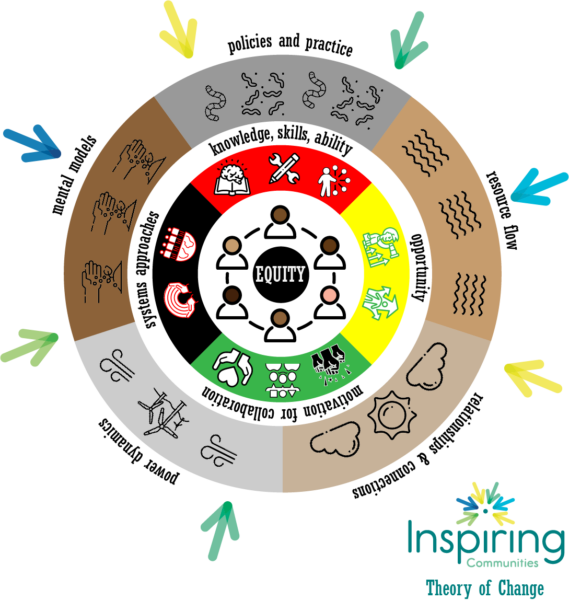How we work
Changing Systems
We recognize that our current systems and institutions don’t work for the people who need them most. Instead, they maintain inequity.
We aim to change systems through building collaborative relationships, developing skills and fostering social experimentation. We engage in reflective evaluation practices to learn from our experiments, integrate that learning into our work, and share what we’ve learned through our regional and national networks.
Theory of Change

With equity at the center, we focus on building capacity in individuals and groups, and also apply influence and pressure to leverage change in the conditions for systems change. Another way of saying this is: “Our strategy for systems transformation across the region is based on bringing diverse voices to the decision-making tables, creating the capacity to act, and fostering a culture of collaboration.”
Collaboration: Systems Partnerships and Affiliations
We find the people and organizations in communities who are engaged in change-making and work to connect, strengthen and amplify their work. We connect with provincial organizations to link their work with the lived experience of those in our communities. And we connect regionally and nationally to share learnings, compare innovation results and build a stronger network of changemakers in Atlantic Canada and beyond.
Experimentation: Connected Community
Three Nova Scotia communities–Digby, Dartmouth North and Northside Cape Breton (Sydney Mines & North Sydney)–are home to established Inspiring Communities initiatives that use processes like collective impact to support change. Each of these sites has a dedicated core staff to work with community in establishing innovative ways to address long-term challenges.
We are exploring new partnerships, in particular with and centering traditional African Nova Scotian communities, Indigenous people, racialized newcomers and others, and 2SLGBTQIA+ communities that have been typically underrepresented and marginalized in social innovation spaces. We recognize intersectionality of identities, and the effect that intersectionality has on people interacting with systems.
Finally, we are exploring other theme-based opportunities, like working on neighbourhood-level climate action that involves residents from underrepresented demographics to better inform scale initiatives proposed at municipal and provincial levels.
Evaluation: Impact and Influence
We share learnings through storytelling about our journey and experiences across our varied initiatives over the years. Employing a range of evaluation approaches, including DE (developmental evaluation), we inform and contribute to evaluative practice in the region. Further, the evidence we collect is shared throughout our ecosystem of social innovation and impact within the region and beyond.